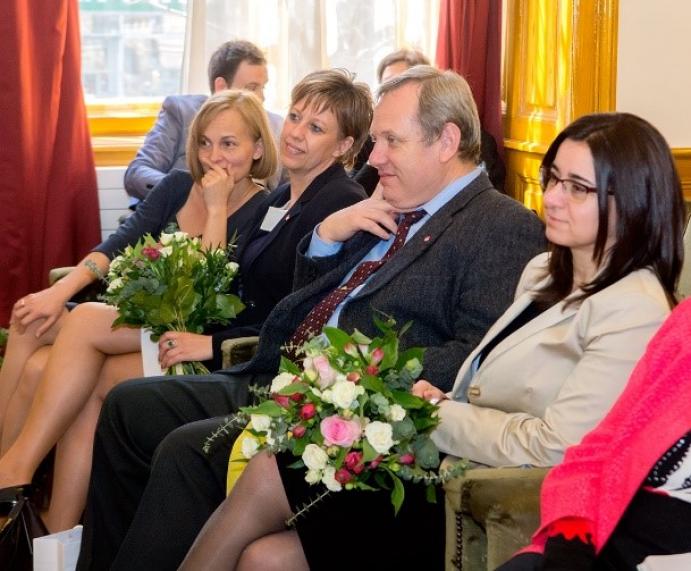
The Department of Translation and Interpreting of the Faculty of Humanities of Eötvös Loránd University (ELTE BTK) and OFFI Ltd. organised their 20th Translation Studies Conference on 22-23 March 2018. In her opening address, Dr. Hajnalka Kárpátiné Juhász, President of OFFI’s Supervisory Board, talked about the 149-year-old Hungarian national translation services and the role that OFFI has been playing in them. She highlighted the importance of creating terminological databases in order to produce consistent and standardised translations of national laws.
Dr. Gabriella Németh, CEO of OFFI Zrt. explained in her speech entitled Judicial ethical dilemmas and related issues in courtroom interpreting how the large volume of requested service in itself carries the risk of losing public trust.
The jubilee conference started with the presentations of the research results of students attending the Translation Studies Doctoral Programme of ELTE including a talk about translators’ attitudes to post-editing of machine translation. The conference continued with the speech of Agnieszka Walter-Drop, Director General of DG LINC (European Parliament), entitled Interpreting in the 21st century. In relation to new technologies in interpreter booths, she highlighted how changes allowed for development and emphasised that we should embrace new technology to further improve the quality of the interpreters’ work.
Alexandra Panagakou, Director of Directorate A for Interpreters, DG SCIC (European Commission), talked about interpreters’ skills and competencies in a changing world. Skills for analysis, problem solving, flexibility and the proficient use of technologies are key competences in the field of court interpreting. In her lecture, Alison Graves, head of the Multilingualism and External Relations Unit, DG TRAD (European Parliament), presented how the role of translators was changing also in the European Parliament. Nowadays, translation should rather be considered a kind of mediation among cultures. Marcin Kotwicki, Head of Quality Assurance Directorate C, DGT (European Commission), talked about the complexity of translation in the EU, explaining that the revisers, reviewers and translators are in constant consultation. The purpose of quality assurance is to spot and avoid errors (mistranslations, terminological errors, omissions, etc.). Although there are special programmes to filter frequent mistakes (e.g. translations of names of months, official titles of laws and references to internal documents) human supervision is also necessary.
Daniela Amodeo Perillo, President of EULITA, presented the ISO 20228 standard on legal interpreting. She talked about the importance of ensuring appropriate conditions for court interpreting. Oxana Yakimenko, a fluent speaker of Hungarian and lecturer at St. Petersburg School of Conference Interpreting and Translation (Herzen State Pedagogical University of Russia), compared the legal and cultural aspects of court interpreting in Russia. Márta Farkasné Puklus, a lecturer at the University of Miskolc, presented her research examining the role of the interpreter in Hungarian court hearings. The opportunity to preliminarily consult the documents of the case is of vital importance for the interpreters, however, most of the time this opportunity is not given to them.
Elena Chiocchetti PhD, Senior Researcher of EURAC Research – Institute for Applied Linguistics, presented the advantages of terminology standardisation via the example of the multi-lingual region of South Tyrol. Prof. Barbara Moser-Mercer, Head of InZone at the University of Geneva, gave a presentation about humanitarian interpreting, which also had a significant emotional impact. She explained that the candidates selected for humanitarian interpreting should receive non-language-specific trainings in order to be able to fulfil their tasks. Ethical questions are much more important in a linguistic and cultural context that is completely different from that of Europe and often also dangerous. Judit Tóth CSc, Associate Professor, Head of Department of the Faculty of Law and Political Sciences (University of Szeged), in her speech entitled The interdependency of interpreting, the courts and the authorities – the courts and legal security described how more than two hundred Hungarian laws mentioned the interpreters and their tasks but there is no law regulating interpreters exclusively. In most of the cases, the legal regulations concerning experts are also applied to interpreters. However, the latter do not participate in the procedure as experts (unlike experts, they have no time for preparation or are not always allowed to consult the documents). Márta Seresi PhD, Assistant Lecturer at the Department of Translation and Interpreting of ELTE BTK, talked about interpreting at the European Court of Justice from a practical perspective.
In the afternoon, the participants of the panel discussion shared their experiences of judicial interpreting. They pointed out that it would be a great advantage if interpreters were always given time for preparation and had the opportunity to consult documents at courts. During their training, future judges and lawyers should be prepared to successfully cooperate with interpreters. As a conclusion, all panellists agreed that knowing the specific situation and being able to prepare for the case allow for court or public service interpreters to feel safe in their work; they also pointed out that the psychological support of the parties in the courtroom does not belong to the tasks of interpreters.
International experiences shared by the speakers of the 20th Translation Studies Conference may significantly contribute to the development of Hungarian court and public service interpreting. The book Latest Trends in Hungarian Translation Studies which can be downloaded here from OFFI’s website, was also presented during the Conference.